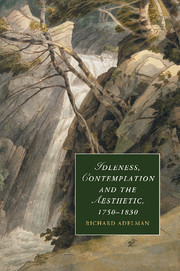Book contents
- Frontmatter
- Contents
- Acknowledgements
- List of abbreviations
- Introduction
- 1 The division of labour
- 2 Utilitarian education and aesthetic education
- 3 Cowper, Coleridge and Wollstonecraft
- 4 Coleridge's Pantisocracy, Biographia and Church and State
- Conclusion
- Epilogue: Wordsworth and Kingsley
- Notes
- Bibliography
- Index
- CAMBRIDGE STUDIES IN ROMANTICISM
Conclusion
Published online by Cambridge University Press: 01 June 2011
- Frontmatter
- Contents
- Acknowledgements
- List of abbreviations
- Introduction
- 1 The division of labour
- 2 Utilitarian education and aesthetic education
- 3 Cowper, Coleridge and Wollstonecraft
- 4 Coleridge's Pantisocracy, Biographia and Church and State
- Conclusion
- Epilogue: Wordsworth and Kingsley
- Notes
- Bibliography
- Index
- CAMBRIDGE STUDIES IN ROMANTICISM
Summary
Coleridge's Church and State aims to house the effects of idle contemplation in an institutional structure designed to be implemented on a national scale. Studying ‘the nobler characters of our nature’ the population ‘will be led by the supernatural in themselves to the contemplation of a power which is likewise super-human’ (C&S, p. 44; Coleridge's emphasis). This is Coleridge's solution to the problems Schiller and Ferguson identified in an advanced division of labour. Church and State utilizes the separation of employments itself in order to dedicate a whole class of labourers to the cultivation of the population. We should remember, however, that this attempt to treat contemporary ills is to be found in a similar form in the Wealth of Nations. Smith observes the necessity of some ‘attention of government’ in order to form a community's ‘abilities and virtues’ if they do not happen to be cultivated in the course of their normal activities. His account of this consideration could even be described as more practical than Coleridge's:
The third and last duty of the sovereign or commonwealth is that of erecting and maintaining those publick institutions and those publick works, which, though they may be in the highest degree advantageous to a great society, are, however, of such a nature, that the profit could never repay the expence to any individual or small number of individuals, and which it, therefore, cannot be expected that any individual or small number of individuals should erect or maintain. […]
- Type
- Chapter
- Information
- Idleness, Contemplation and the Aesthetic, 1750–1830 , pp. 133 - 140Publisher: Cambridge University PressPrint publication year: 2011

